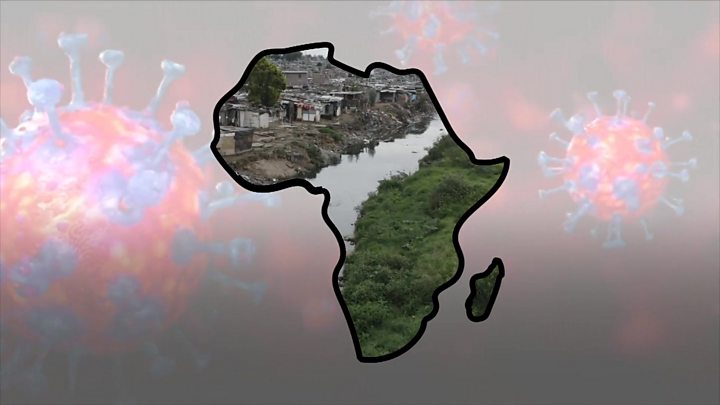Bracing for coronavirus in a South African township
As the number of coronavirus cases in South Africa rises quickly, BBC Africa correspondent Andrew Harding visits a poor neighbourhood in the main city Johannesburg to see how it will cope with an outbreak.
In the narrow, muddy alleys, lined with makeshift homes, that lead down to a rubbish-strewn stream on the edge of Alexandra township, there is no real debate about whether this continent is likely to cope with coronavirus.
“If the virus comes here it’s going to kill everyone,” said electrician Nicholas Mashabele, watching a crowd of men playing cards beside a communal tap and an open drain. The other men nodded in agreement, although 80% of people who are infected only develop mild symptoms.
“We don’t have money to buy hygiene [products] to protect ourselves. We’re living in high risk,” added Mr Mashabele.
‘Containment now is crucial’
As in many poorer communities around South Africa, and indeed across the continent, families in informal settlements in Alexandra on the outskirts of Johannesburg often live in cramped single rooms and share communal outdoor toilets with dozens of neighbours.
Simple suggestions to battle coronavirus – like washing hands regularly – present fundamental challenges.
“We are going to struggle,” said Mr Mashabele’s wife, Shebi Mapiane, as she prepared an evening meal for her three children in the tiny upstairs room they rent.
“My neighbour is just here,” she added, pointing to the wall. “If I catch it, he’ll catch it, and everyone will catch it. So, it’s dangerous.”
That concern is shared by many health experts in South Africa, some of whom privately describe the continent as “a tinderbox”.
“My biggest worry is… if this spills over into poorer communities where it’s more difficult to identify patients and to contain [the virus],” said clinical biologist Dr Alison Glass.
“That’s why containment now is so crucial.”
Compounding those worries is uncertainty about the impact of the new virus on people already living with HIV – particularly the estimated 2.5 million in South Africa who are not taking anti-retroviral drugs.
“In those individuals we’re likely to see more severe infections,” said Professor Salim Abdool Karim, who heads the country’s leading Aids research centre in the coastal city of Durban.
Learning from Asia and Europe
But in the wealthier Johannesburg neighbourhood of Richmond, a very different picture of South Africa’s readiness to deal with the virus was on display. Cars pulled over to park outside a private laboratory where groups of medics in protective gear stood ready to perform “drive-in” Covid-19 tests.
“I was starting to present with a bit of a cough, and a slightly sore throat,” said a university student who had driven himself to be tested after a fellow student was confirmed to have the virus.
The South African government, its National Institute for Communicable Diseases (NICD), and the health system at large have been widely praised for their initial response to the pandemic, and appear to have made good use of the extra weeks this continent has been given – as the pandemic has torn through Asia and Europe – to learn from the mistakes and successes of other nations.
“Fortunately, our country is well prepared. When I look at what we know about this virus I have minimum cause for concern,” said Professor Karim.
“If we take steps and ensure we react appropriately and take the necessary precautions I think we’ll be able to contain this infection.”
South Africa, along with many other African governments, is moving early on its outbreak to introduce measures in line with many Asian countries – with policies on the tougher, more restrictive end of the spectrum.
‘I’m frightened’
South Africa has already closed down schools, and is blocking foreign visitors and banning gatherings of more than 100 people.
Local authorities are discussing measures to prevent panic-buying, and plans are even being drawn up to allow the elderly to shop at special times.
More on Africa and the virus:
“The key is to get the basics right,” said Dr Kerrigan McCarthy from NICD, who added that the focus needed to be on communities, rather than on hospitals.
“We need community and individual commitment to trust the advice of government and adhere to it in terms of isolation, quarantine, social distancing and good hand hygiene. But should we have a community level outbreak… that will definitely swamp our health systems,” she said.
Health Minister Dr Zweli Mkhize said: “It’s the same problem in the UK, in Canada, in the US… It depends on how we respond. We need to mobilise people to be ready to fight the spread and work together. We can contain it.”
There is hope that warmer weather across much of the continent will help suppress the virus. And there is a strong belief that the experience many countries have had, over decades, in tackling HIV, malaria, cholera, Ebola and many other diseases, means that even underfunded health systems may be better prepared than in other parts of the world to fight coronavirus, particularly at community level.
But at rush-hour at the crowded central bus station in Alexandra, many commuters did not appear too confident as they waited in line before squeezing on board cramped mini-buses for the journey home.
“I’m frightened. Truly. I don’t know who is infected and who is not,” said one woman.
“If I had any alternative transport I would definitely [use it] but unfortunately, I have no choice. I have to work to feed my family so I can’t afford to stay at home.”
Source: Read Full Article



